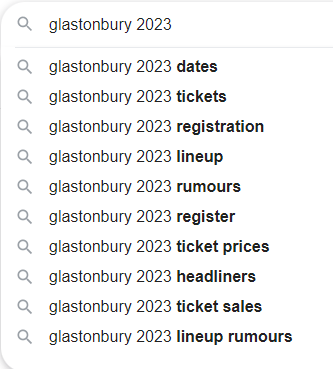
Recurring events and seasonal stores can provide fantastic opportunities to increase business performance and create meaningful engagement with a wider repeat audience.
From smaller localized exhibitions and pop-up shops to major music festivals and industry-leading shows, the opportunity to dive into these organic seasonal marketing campaigns should not be overlooked.
There have been some great articles written about optimizing the Google Event Pack and Search Carousel with Schema, so I won’t cover those items again here.
And, if you’re looking for a seasonal marketing calendar to inspire you, here’s a handy marketing calendar for 2022.
This post will help you shape your SEO strategy to maximize recurring seasonal events such as Black Friday, Christmas, and Cyber Monday that apply to online businesses and offline pop-up stores.
This will also help event-oriented brands of all sizes to effectively optimize for repeat industry expos, festivals and other forms of attendance-based SEO campaigns, no matter how localized.
Attention to consumer intent thoroughly
Basically, you need to be visible in the conversation for every dominant area of intent surrounding your event within the major search engines.
There are many ways to collect data on the topical information that people associate with your event.
You should also explore data about larger, more established competitors who may be better known than your event, but closely match your own niche positioning.
The easiest data point is directly in Google search results and predictive search.
The following example shows Google’s prevailing predictions based on a large amount of historical search data.
This removes tons of initial data work and points you in the direction of the main subtopics you’ll need to cover comprehensively by curating valuable content.
Screenshot of the search for [glastonbury 2023]October 2022Consider the above as initial keyword themes or topics from which you can expand your content digests, with the goal of developing a series of content-rich destinations to grow your SEO success.
Orientation to organic visibility within SERPs
The biggest opportunity to get your brand, seasonal event or pop-up store in front of new and existing audiences is by targeting rich, pre-clickable results on Google’s search engine results pages (SERPs).
Sticking with this same Glastonbury Festival example, you can identify and prioritize which rich results and mixed search results you want to target through your SEO strategy.
At first, four key areas stand out.
First, the “People Also Ask” segment. This appears directly below the first SERP result in this scenario.
This is often an opportunity for a brand to appear multiple opportunities on the first page or for coverage you may have that is placed on highly relevant external sites.
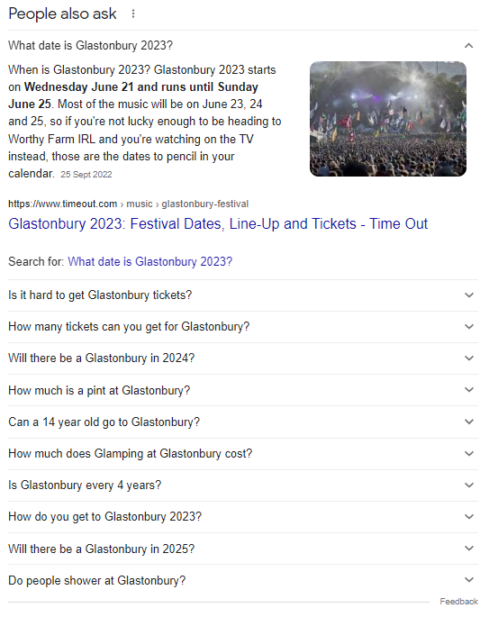 Screenshot of the search for [glastonbury 2023]October 2022You’ll often see industry-specific media sites occupy this space alongside more in-depth forms of content such as guides and white papers.
Screenshot of the search for [glastonbury 2023]October 2022You’ll often see industry-specific media sites occupy this space alongside more in-depth forms of content such as guides and white papers.
The bottom line is that these are non-competing sites where you have a genuine reason to place content directly on their sites and be present in more than one of the top positions on Google.
Next is the videos section, which is often used for recurring event-related seasonal intent search queries.
To help rank your video content, traditional video optimization tactics are applied.
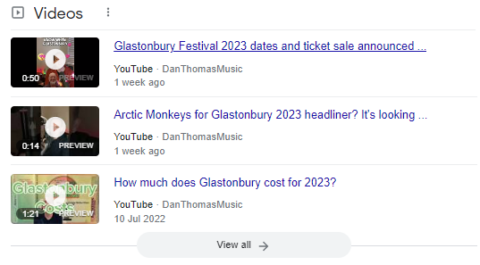 Screenshot of the search for [glastonbury 2023]October 2022The other main in-SERP results to target, in this case, are images:
Screenshot of the search for [glastonbury 2023]October 2022The other main in-SERP results to target, in this case, are images:
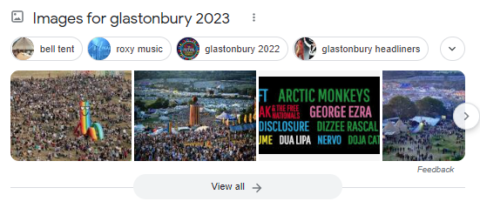 Screenshot of the search for [glastonbury 2023]October 2022And the “Related Searches” results, which appear at the bottom of the page:
Screenshot of the search for [glastonbury 2023]October 2022And the “Related Searches” results, which appear at the bottom of the page:
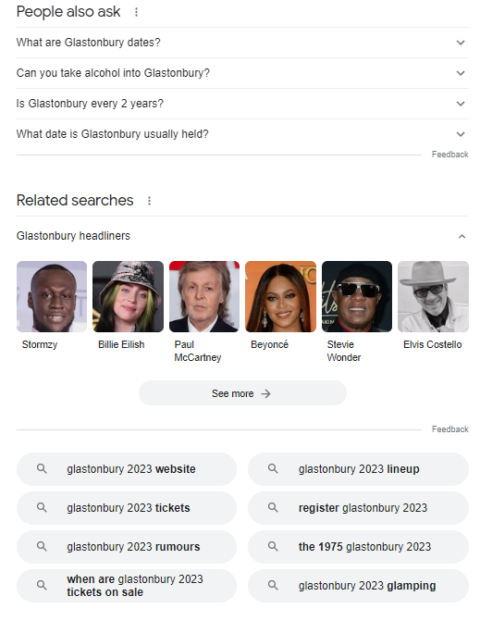 Screenshot of the search for [glastonbury 2023]October 2022The integrity of single page coverage is the underlying factor to be present in these rich results, in addition to the type of previous content and technical optimization through the scheme.
Screenshot of the search for [glastonbury 2023]October 2022The integrity of single page coverage is the underlying factor to be present in these rich results, in addition to the type of previous content and technical optimization through the scheme.
As a tip, always look at who is filling these in-SERP spaces and consider where the topical gaps are in external content and what signals you can improve (social media, backlink value, authorship, trust, credibility, quality of various content type etc.)
Dominate the local landscape
Local SEO is a common thread in all recurring events and seasonal or pop-up store SEO strategies.
Locality is the trigger from which all mobile searches are filtered.
Local intent has also grown substantially faster over the past two to three years.
In fact, search trends associated with location intent have been experienced, such as ‘shop near me’. significant growth since 2017:
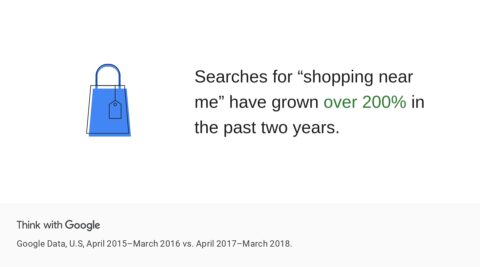 Screenshot from Think With Google, October 2022
Screenshot from Think With Google, October 2022
There are many practical tactics for optimizing your website for local SEO, and some of the most effective include:
Actively participate in local forums and business events. Content promotion, PR and other brand signals through local media sites. Develop experts to promote your authority locally and more broadly. Creating content-rich local landing pages. Creation of relevant inbound links for companies, entities and sectors. Proactive management of social media channels, including local social listening. Maximizing Google and Bing Places business profiles.
Adopt a permanent approach to seasonal marketing
Just because you’re heading to an event at Christmas or an exhibition in September doesn’t mean you have to look at SEO the month before.
Seconds recent data from Google about consumers:
“… 40% of U.S. holiday shoppers say their holiday shopping experience has made them think about shopping much earlier for other milestones this year.”
Google goes further with this in the same article to say:
“As of June 2021, 31% of US shoppers had already started their holiday shopping and 37% of shoppers who shopped last holiday season wished they had started sooner.”
So what does this mean for your SEO strategy for recurring seasonal marketing and pop-up stores?
The direct impact of this change in behavior is that you need to have an always-on element for your seasonal SEO.
This provides the opportunity to grow authority on the subject year after year.
It means you can stay actively visible for core topics that can’t be modified (“music festival”, “local pop-up shop”, “Christmas bundles”, etc.) to get the most out of initial purchase intent .
You can also mark off previous years’ events by having annual landing pages that continue to drive value to the site and support next year’s earnings. An example would be Glastonbury 2022.
This also presents a means of targeting future intent.
Continuing with the same example above, we can look at Glastonbury 2023 (and beyond).
You might be surprised that people are planning 2 or more years out with bigger seasonal events. The following is an existing rich result ready to be optimized for Google:
 Screenshot of the search for [glastonbury 2023]October 2022Being the first to identify and act on this type of future user intent opens up the opportunity to be first and be the company that dominates these key elements of visibility.
Screenshot of the search for [glastonbury 2023]October 2022Being the first to identify and act on this type of future user intent opens up the opportunity to be first and be the company that dominates these key elements of visibility.
Final quick tips for seasonal marketing
So many important strategic elements fall into the realm of seasonal and event-based marketing for SEO.
Here are some more tips to help you with your own marketing efforts:
Make the most of the urgency. As events approach, people must act quickly. Make this process as quick and simple as possible; give people everything they need in one place. This will be different from an e-commerce store to a brochure site, but the goal remains the same.
Be the most convenient option. If you’re a local pop-up shop, immerse yourself in the local community and serve people’s problems. Think about what you can offer that a larger or non-local company can’t. For example, free local delivery or same-day pop-up service.
Keep things simple. If you’re only open two days a week or during certain seasonal dates, provide advance booking, 24/7 online support, and related customer service. This will help pre-fill reservations and orders and maintain a positive sentiment for future repeat business.
More resources:
Featured Image: Rohappy/Shutterstock
[ad_2]
Source link




